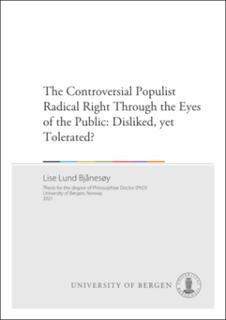| dc.description.abstract | This thesis is about the populist radical right and why we need to study this group of parties. I ask the following research question: Why is there exceptional political controversy around the populist radical right? To answer this question, I employ a public opinion perspective, examining how voters relate to the populist radical right compared to other political parties. While much of the previous literature has focused on explaining populist radical right success and voting patterns, I argue for a different approach.
In this thesis, the populist radical right is examined using two concepts rarely seen in studies on this group of parties: public political tolerance and negative partisanship. Combining these two concepts, the thesis reveals new insight into the political controversy surrounding the populist radical right. The thesis finds that there are substantial variations in public political tolerance of populist radical right parties in Western European democracies, ranging from fully tolerated to tolerated by only half of the electorate. Despite these variations, the thesis finds that even the most tolerated populist radical right party (the Norwegian Progress Party, FrP) is particularly disliked by voters and has a larger share of negative partisans compared to all other parties in the system. Negative partisanship thus provides a deeper understanding of voters' attachment to these parties in the electoral system.
This thesis contributes with four research articles, each with its own independent contribution. The first article, "Public Political Tolerance of the Far Right in Contemporary Western Europe," shows how the public, to various extents, tolerates parties of the populist radical right in five Western European democracies. It contributes a new theoretical framework to better understand public political tolerance of the far right, including both established political parties and extra-parliamentary actors. The theoretical framework builds on two dimensions: (1) public rejection of the Nazi past and (2) party institutionalization. The article finds that, for large shares of citizens in fi ve key Western European democracies, rejecting the Nazi-past only means rejecting initiatives explicitly identi ed as neo-Nazi. For other far right initiatives, public political tolerance is much more common and increases in accordance with these initiatives' institutionalization as political parties.
The second article, "Political (In)tolerance of the Far Right: The Importance of Agency," builds on and further develops the theoretical framework presented in article 1 and demonstrates which factors that contribute to increase or decrease political tolerance. The paper uses a conjoint experimental design, varying a range of factors explaining the ideology, legacy, institutionalization, and agency of the far right. It finds that the agency of populist radical right parties is crucial for political tolerance. Nevertheless, ideological features, and particularly signs of right-wing extremism, are the most important factors negatively affecting public political tolerance of the far right.
The third article, "Negative Partisanship and the Populist Radical Right: The Case of Norway," builds on recent research demonstrating that the populist radical right party family has a larger share of negative partisans compared to other parties. The article sets out to explain why many people would never vote for the populist radical right combining closed and open-ended survey responses. It finds that negative partisanship is not a mirror image of support. The results reveal that negativepartisans react against both the party's policies, particularly migration, economic and environmental policies, and also the party's rhetorical style.
The final article, "Effects of the Refugee Crisis on Perceptions of Asylum Seekers in Recipient Populations," published in the Journal of Refugee Studies in 2019, examines more closely some of the issues that article 3 found to be important for never considering voting for the populist radical right. The article addresses how people perceive asylum seekers using open-ended survey items asked before and after the 2015 refugee crisis. The article finds that people perceive asylum seekers in fundamentally different ways, which can shed light on why many people react to the migration policies promoted by the populist radical right.
In sum, this thesis contributes to the literature on the populist radical right by highlighting a new approach employing a public opinion perspective without using voting as dependent variable. The findings in this thesis are based on carefully designed survey experiments and open-ended survey questions and provides empirical evidence from a systematic and detailed comparative study, all emphasizing the voters' point of view. All articles consistently show that what sets the populist radical right apart is its ideology. Although the ideology does not necessarily prevent the populist radical right from being tolerated by the public, the ideology and rhetorical style contributes to negative partisanship. | en_US |
